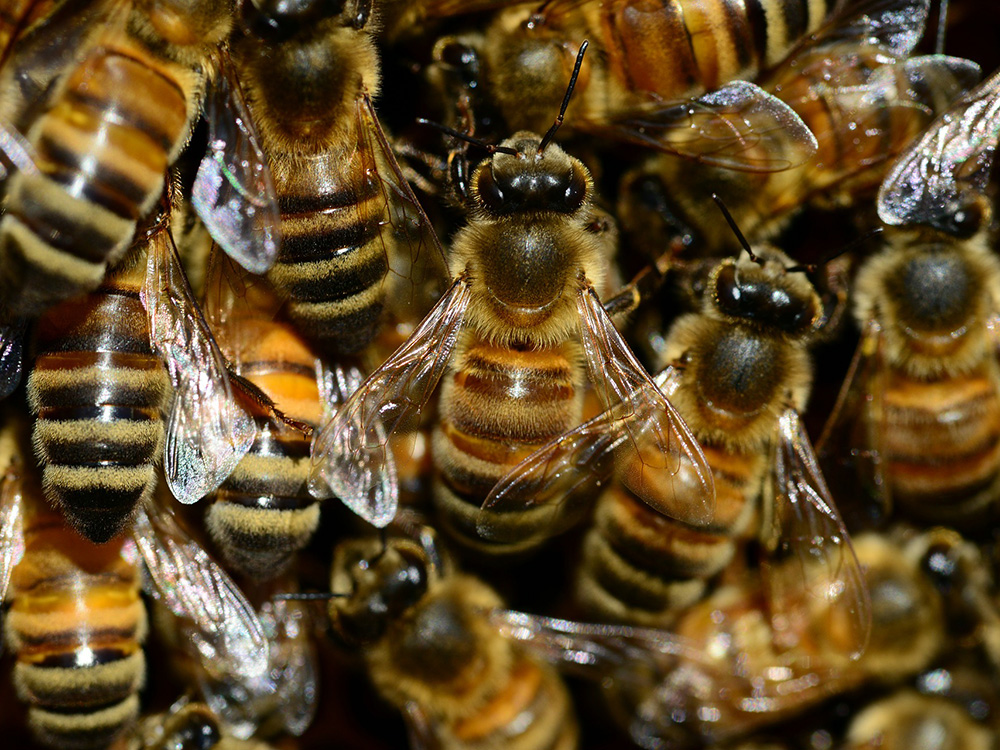Der Anteil der Honigbienenvölker, die den Winter nicht überleben, schwankt stark über die Jahre und zwischen den Regionen. Diese Völker werden üblicherweise im Laufe des Jahres durch die Arbeit der Imkereien wieder aufgebaut. Insgesamt ist die auf 354.000 geschätzte Anzahl der Bienenvölker in Österreich seit 2000 weitgehend stabil. Den Winter 2016/17 haben rund 23 Prozent davon nicht überlebt. „Das sind die dritthöchsten Verluste der letzten zehn Jahre“, erklärt Dr. Robert Brodschneider vom Institut für Zoologie der Uni Graz. Er erhebt seit 2007 gemeinsam mit ImkerInnen die Winterverluste von Bienenvölkern in Österreich und sammelt damit wichtige Daten zum Schutz dieser Insekten. Eine Rekordzahl von 1656 Imkereien hat sich heuer beteiligt und Angaben zu insgesamt 43.852 im Herbst 2016 eingewinterten Völkern zur Verfügung gestellt.
Im Jahr davor lag die Sterblichkeit bei geringen acht Prozent. „Heuer gab es – im Gegensatz zum Vorjahr – vor allem in Vorarlberg hohe Völkerverluste. Die Rate schwankt zwischen den Bezirken der einzelnen Bundesländer, in einzelnen Regionen mussten die Imkereien Verluste von über 40 Prozent hinnehmen“, sagt Brodschneider.
Univ.-Prof. Dr. Karl Crailsheim, Leiter des vom Bundesministerium für Land- und Forstwirtschaft, Umwelt und Wasserwirtschaft in Auftrag gegebenen Forschungsprojektes „Zukunft Biene“ (2014–2017), das die Untersuchung der Bienengesundheit in Österreich zum Ziel hat, nennt auch aufgrund einer ausführlichen Vorjahresstudie mehrere Ursachen für die Wintersterblichkeit: „Im Rahmen des Projektes haben Uni Graz und AGES in den Jahren 2015 und 2016 fast 2000 Bienenvölker in ganz Österreich mehrmals genauestens untersucht und dabei wertvolle Erkenntnisse gewonnen“, berichtet Crailsheim. „Bei den toten Völkern dieser Studie konnte häufig ein hoher Befall mit der Varroa-Milbe und dem Flügeldeformationsvirus in der vorangegangenen Saison nachgewiesen werden.“ Zusätzlich spielen Faktoren wie das Wetter, der Aufbau ausreichend starker Überwinterungskolonien und die Verfügbarkeit von Nahrungspflanzen eine Rolle.
Wintersterblichkeit von Honigbienen 2016/17 (Stand: 6. Juni 2017)
| Verlustrate in Prozent | Teilnehmende Imkereien | Beteiligung in Prozent | |
|---|---|---|---|
| Österreich | 23,0 | 1656 | 6,2 |
| Burgenland | 20,2 | 59 | 10,2 |
| Kärnten | 21,9 | 181 | 6,3 |
| Niederösterreich | 24,2 | 433 | 9,9 |
| Oberösterreich | 18,9 | 264 | 3,6 |
| Salzburg | 16,8 | 78 | 3,1 |
| Steiermark | 19,3 | 233 | 6,2 |
| Tirol | 25,1 | 131 | 4,9 |
| Vorarlberg | 33,8 | 207 | 13,8 |
| Wien | 24,8 | 70 | 9,9 |
Wintersterblichkeit von Honigbienen in Österreich seit 2007/08
| Jahr | Verlustrate in Prozent |
|---|---|
| 2007/08 | 13,3 |
| 2008/09 | 9,3 |
| 2009/10 | 14,7 |
| 2010/11 | 16,4 |
| 2011/12 | 25,9 |
| 2012/13 | 17,3 |
| 2013/14 | 12,8 |
| 2014/15 | 28,4 |
| 2015/16 | 8,1 |
| 2016/17 | 23,0 |
Zahl der Imkereien und Bienenvölker in Österreich (Quelle: Biene Österreich)
| Jahr | Imkereien | Völker |
|---|---|---|
| 2000 | 25.541 | 363.967 |
| 2003 | 24.421 | 327.346 |
| 2006 | 23.000 | 311.000 |
| 2010 | 24.451 | 367.583 |
| 2011 | 24.490 | 368.183 |
| 2012 | 25.099 | 376.485 |
| 2013 | 25.492 | 382.638 |
| 2014 | 25.277 | 376.121 |
| 2015 | 26.063 | 347.128 |
| 2016 | 26.609 | 354.080 |
Die Untersuchung wurde nach Standards der internationalen Non-Profit-Vereinigung COLOSS (Prevention of honey bee colony losses) durchgeführt.
Weiterführende Informationen:
www.Zukunft-Biene.at
www.Bienenstand.at
www.coloss.org
